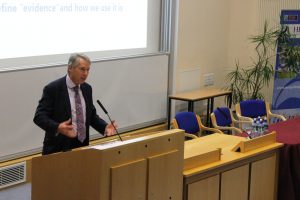

There is a need to grow and improve public health evidence in order to get the right answers to the right policy questions, Sax Institute senior adviser Professor Don Nutbeam told a major health promotion conference in Ireland this month.
Professor Nutbeam delivered the keynote address at the 20th annual Health Promotion Research Centre Summer Conference at NUI Galway, which focused on the use of research evidence in developing and implementing inter-sectoral policy and innovative practice for health promotion.
This meeting marked 30 years since the publication of the World Health Organization Ottawa Charter for Health Promotion and Professor Nutbeam outlined some of the many changes that have impacted public health practice and policy over the past three decades.
The globalisation of trade had significant social and economic consequences for countries and their citizens, he said, and patterns of migration were having profound effects on living and working conditions, as well as social relationships.
There had also been changes in the profile of the burden of disease, with new threats to health emerging, including HIV, SARS and obesity.
Intervention research shortfalls
Amid these changes, it was important to develop effective ways of building new evidence, and translating that evidence into effective health promotion policies, Professor Nutbeam said.
Policy making was rarely an “event”, but tended to emerge over time, with changes being driven by underlying analysis and beliefs about the state of evidence, the social and political climate and the power and influence of competing interests, he told the conference.
He said current public health intervention research often confused “evidence” with descriptions of determinants and modifiable risk factors, and confused “quality” with methodology, resulting in research that focused on “single risks, single methods and single settings”.
“We learn more about less and less,” he said.
A richer evidence base
“We need to combine research methods – quantitative and qualitative – and build evidence derived from a much richer base of knowledge and experience, so that we get the right answers to the right questions,” he said.
It was also necessary to recognise the complementary role of effective public health advocacy as a part of the policy development process, he said, and for public servants, academics and public health practitioners to build skills in the rapid appraisal of evidence.
“We need to work with policy makers to understand more clearly the type of questions that need answering, and to continue to develop the research methods that deliver the best possible answers to questions of greatest public health importance.”
Professor Nutbeam met with newly appointed Irish Minister of State for Health Promotion, Marcella Corcoran Kennedy, and several senior public servants for a roundtable discussion about evidence transfer and Sax Institute’s role in facilitating the use of evidence in practice and policy in Australia.
Following the Irish conference, he addressed a seminar on health literacy at the University of Southampton, where he was formerly Vice-Chancellor, and met with colleagues involved in the University’s Global Health Program, and Public Policy@ Southampton, an institute that supports researchers during the science to policy process.
Find out more
- Find out more about the Sax Institute’s Knowledge Exchange program
- Read Professor Nutbeam’s opinion piece: In pursuit of rigorous evaluation in the real world





